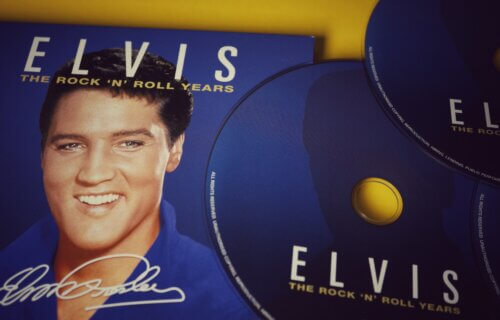From the smooth cronies to melodious beats pouring out of jukeboxes, the 1950s were a roaring time that left an indelible impact on the fabric and future of pop culture. As an era of musical revolution, the 1950s introduced us to all-time greats such as Ray Charles, Elvis Presley, Sam Cook, and countless more. Given the impact of music during the decade, it’s little surprise to learn that the best songs of the 1950s continue to be among the greatest hits of all time.
As it so happens, music from previous generations resonates with younger generations. Perhaps it’s the nostalgia of being transferred back to a time when life was simpler, or perhaps it’s because the lyrics had greater depth and meaning. Either way, it’s interesting to learn from a new study that the best way to connect with trendy millennials is through older music. The researchers attribute this finding to the sheer variety of hits released in the latter half of the 20th century. Billboard hits released in the ’40s and ’50s and the new millennium, conversely, tend to be more sonically similar.
Best of all, no matter your mood, music can improve your day. Not only with establishing long-life connections but more specifically with helping us navigate our most pivotal life moments. In fact, a recent study found that listening to music can lower stress and improve mood during challenging times. As discovered, the analysis linked the latter to lowering stress by an average of eight percent and boosting mood by 90 percent.
Ready to groove? Swaying to the rhythm of the blues under neon lights, the Golden Decade was an iconic time in American history. Defining a generation, the best songs of the 1950s strike a chord with infectious melodies and heartfelt lyrics. Don’t happen to see your favorite tune? Leave your suggestions in the comments below!

The List: Best ’50s Songs, According to Music Experts
1. “Johnny B. Goode” by Chuck Berry (1958)
To this day, this classic is a timeless rock ‘n’ roll anthem that reverberates its electrifying beat. As Heywood Wakefield describes, “This song is arguably the most iconic guitar riff of all time.” In 1958, this “song was a smashing success” and to this day is “considered one of the most important songs in the history of rock and roll.”
The lasting impact of “Johnny B. Goode” compounded with Chuck Berry’s radical and innovative guitar techniques influenced countless generations of artists. Moreover, this hit turned Berry into a cultural phenomenon. As NME recounts, “That riff, that piano, and that chorus – is all packaged into a timeless track about rock ‘n’ roll itself.” To add, it’s been used to cover hundreds of films, from “B.B. King, Back To The Future, and the Voyager Golden Record.” This song was “even sent into space to demonstrate the cultural capacity of life on Earth!”
Beyond the foot-tapping rhythm and catchy melody, Johnny B Goode played a pivotal role in the integration of popular music, being widely embraced by diverse audiences. During a time where racial divide was at its heights, it’s inspiring to know this song helped to bridge differences and bring about social change. To some, “You might know ‘Johnny B. Goode’ from the soundtrack of Back to the Future, one of the most iconic films of the 1980s,” writes Zing Instruments. “The song depicts the story of Berry’s life, a musician coming from humble beginnings, a penchant for guitar, and a unique journey that led to his famed musicianship.”
2. “Hound Dog” by Elvis Presley (1956)
“Hound Dog” grabs listeners by the ears with its raw and unbridled energy. From the moment the beat kicks in, you feel the seismic shift echo within. As NME puts it, “Elvis changed the track into a hip-swiveling pound of rolling drums and grinding guitars that set teenage girls alight and made parents blush.” Originally, “Hound Dog“ was released by Big Mama Thorton but Elvis covered it. During its time, it was one of the few tracks that “sounded that rampant, fiery nature of spurned love.”
When Elvis covered this hit, it received immense popularity and helped introduce audiences to a song originally recorded by a Black artist – helping to blur the lines and integrate the musical landscape. In every way, it was no small feat. As Heywood Wakefield describes, “Hound Dog by Elvis Presley is one of the King’s most iconic songs.” It was first released in 1952 and it “certainly grew to become one of the most iconic songs of the decade.”
Youth culture and rebellion are the center of Hound Dog. Easily one of the most influential works of the decade, “Hound Dog” by Elvis solidified his status as a true music legend. As Zing Instruments states, “Hound Dog will probably always be considered one of the best songs of the 1950s.”
3. “Rock Around the Clock” by Bill Haley & His Comets (1954)
The cultural impact of “Rock Around the Clock” cannot be overstated. For these reasons, it’s one of the best songs of the 1950s. As Rolling Stone breaks down, “The song rocked around the calendar and ultimately became the first Number One of the rock and roll era.” However, it wasn’t always smooth sailing for the song, as the song “didn’t top the charts until summer 1955,” which was a year after its initial release.
Reaching the top of the charts, “Rock Around the Clock” launched Bill Haley & His Comets into international stardom. As part of the song’s success, a wave of rock ‘n’ roll mania swept across the world. As ACC Group recalls, “Billy is the guy who brought rock ‘n’ roll to the charts, but for a predominantly teen-driven movement.” Leading a well-established team, “Bill and His Comets have established themselves as pioneers.”
Released in a post-war era, the song resonated with a rebellious spirit and sparked a musical revolution. With a lively upbeat tempo and Bill’s iconic vocals, this song is not only one of the best songs of the 1950s but in the history of rock ‘n’ roll too. Don’t believe us? As Music Grotto points out, “This song remained at number one on the US charts for two months straight.” Despite going through “various versions and studios, this song found success” but “only after it was passed to Bill Haley & His Comets.”
4. “I Walk the Line” by Johnny Cash (1956)
“I Walk the Line” by Johnny Cash is a timeless and evocative country classic still loved to this day. Reaching the top of the country charts, this song earned Cash a dedicated fanbase and solidified his status as one of the most influential country figures in music history. As Zing Instruments says, “I Walk The Line is probably the most famous Johnny Cash song and is a blend of rock, country, and folk music.” More surprisingly would be how “the song was written by Cash before recording it in 1956.” In terms of messaging, “it’s a love song that reminds him of how much he loved his wife’s song and didn’t wish to betray her.”
The impact of this classic continues to echo through the halls of country music. As an anthem for love and fidelity, this hit contributed to the popularization of country music. As Heywood Wakefield recalls, “I Walk The Line was an early country crossover hit in 1956.” Making country music more accessible, “this Johnny Cash classic managed to climb the pop charts as well as the country charts.”
A soul-stirring country masterpiece, “I Walk The Line” is one of the best songs of the 1950s. And for good reason. As Taste of Country mentions, “I Walk The Line was released on the legendary Sun Records in 1956 and gave Johnny Cash the first number one single of his career.” And like with many of his classics, “this was penned by him for his first wife, Vivian Liberto, the mother of Rosanne Cash.” Not to mention, “The song also helped establish the signature “boom-chicka-boom” sound created by his band, the Tennessee Two.”
5. “Tutti Frutti” by Little Richard (1955)
Everyone’s heard of the boogie-woogie, and we have “Tutti Frutti” to thank for that. This hit celebrated life and the unabashed expression of the teenage spirit. As NME recounts, “This was Little Richard’s best track and it was revolutionary in terms of how it shaped rock and roll.” More importantly, it’s impact wasn’t “just musically but in its pioneering use of double entendre.”
Beyond immediately becoming a hit, Little Richard experienced trailblazing success as a Black artist during a time when that space was predominately white dominated. This in turn broke down racial barriers and helped open the future for more diversity in music. As ACC Group describes, “Little Richard’s Best Song was groundbreaking in how it shaped rock and roll.” Popularizing the “use of dual meanings” in songs, “Tutti Frutti” was ahead of its time.
With a mix of gospel, the blues, and the boogie-woogie, the song is a timeless rock ‘n’ roll anthem. To this day, the song remains an iconic representation of the spirit of the early days of rock and roll. As Music Grotto depicts, “In 1955, Tutti Frutti made history with its release due to its unique vocalizations, musical style, and percussive elements.” More recently, “the song was voted number one on the list of Top 100 Records that Changed The World in 2007.”
You may also be interested in:
Sources:
- NMe
- ACC Group
- Music Grotto
- Rolling Stone
- Taste of Country
- Zing Instruments
- U Discover Music
- Heywood Wakefield
Note: This article was not paid for nor sponsored. StudyFinds is not connected to nor partnered with any of the brands mentioned and receives no compensation for its recommendations.

You’re missing the del-Vikings “come go with me “ whispering bells.
Smoke gets in your eyes,and many others